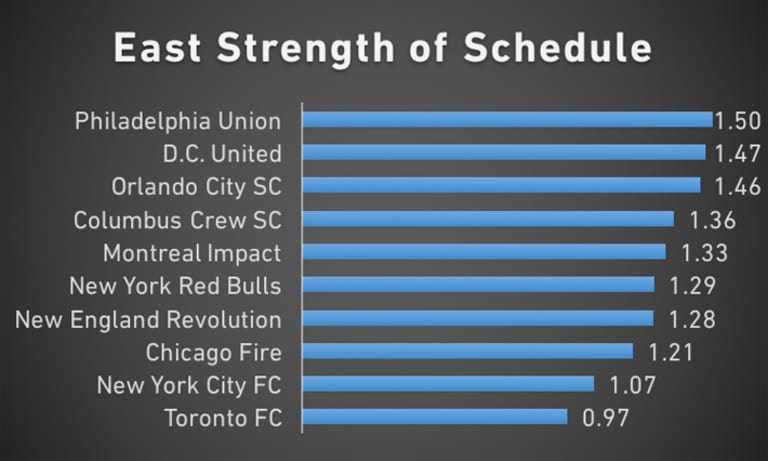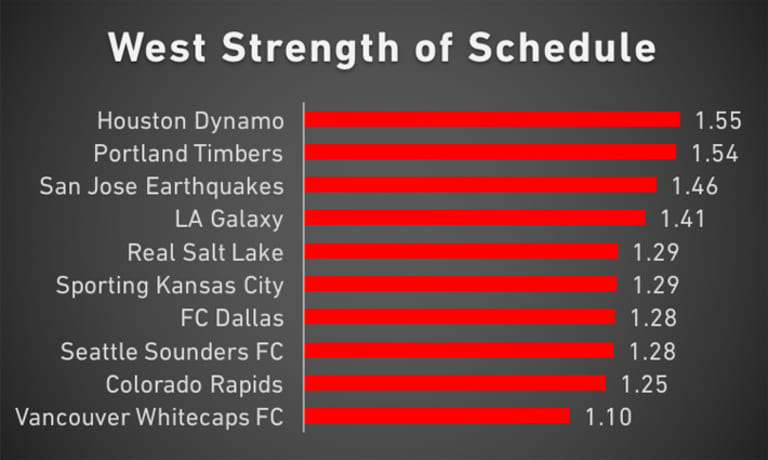Like life, Major League Soccer is all about timing.
When the stretch run comes and playoff places and seeding are in the balance, are you trending up, building momentum ahead of a potential MLS Cup run, or are you fading away, destined to spend November watching from home?
For the time being, all 20 MLS teams are still alive -- some thriving, some treading water, and some holding on by a thread -- in the race for 12 MLS Cup Playoffs spots. In this edition of the Red Line Report, we thought we'd help fans better understand where their team stands during this critical juncture of the season.
To do that, we turned to the Expected Goal (xG) metric, which you can read about here. Thanks to OptaPro, you can examine each team's xG difference for every game they've played this season in the charts below.
The blue trend line in each chart indicates average xG differential (xG scored minus xG allowed, xGD for short). The X axis represents 0 xGD.
Did you spot the trends?
Take a close look at the Galaxy plot. After a positive start, according to xG, LA's differential has been in steady decline, which makes sense because they have not won since July 23.
Meanwhile, you can see a clear positive trend in Real Salt Lake and Toronto FC's plots. The results bear that, as well, with both teams steadily climbing the table behind strong performances.
Now, let's take a look at two teams hovering around the red line. D.C. United and Orlando City SC both scored huge wins last weekend, with United toppling the Chicago Fire, 6-2, and Orlando riding Kaká to a 2-1 win vs. New York City FC.
As a result, United held onto the No. 6 seed in the Eastern Conference, one point ahead of Orlando. The race is likely to be neck and neck down the home stretch, and separating these two teams could be difficult. That's where OptaPro data scientist Tom Worville comes in.
Here's Worville's takeaway from D.C. United's 2016 xGD plot, where you'll notice that 6-2 win resulted in an xGD close to plus-3: "They've produced some of their best attacking displays since Patrick Mullins debuted against Toronto – the dotted line is his first game. In each game since Mullins' arrival, D.C. had a positive (above the X axis) xGD."
As you can see, D.C. have hovered above 0 xGD all season, seeing gradual improvement as the season's gone on. Not so for Orlando City.
The Lions put themselves in a xG hole from Day 1, and Worville points out that they'd yet to break the plus-2 xGD mark until last weekend, when jumped to 2.45. Their previous high was 1.34 xGD against Philadelphia back in May.
So while they're trending upward, it may not be enough to overcome a slow start: "It’ll be interesting to see whether this trend continues," Worville says, "and if Jason Kreis can get the most out of the talented platoon of attackers at his disposal."
If the regular season ended today ...
Eastern Conference Playoff Bracket
Conference Semifinals
1. Toronto FC
Conference Semifinals
2. New York City FC
Knockout Round
3. New York Red Bulls
VS.
6. D.C. United
Knockout Round
4. Philadelphia Union
VS.
5. Montreal Impact
Western Conference Playoff Bracket
Conference Semifinals
1. FC Dallas
Conference Semifinals
2. Real Salt Lake
Knockout Round
3. Colorado Rapids
VS.
6. Portland Timbers
Knockout Round
4. LA Galaxy
VS.
5. Sporting Kansas City
Strength of Schedule and Expected Points
The strength of schedule metric takes into account the average points per game (PPG) that each team's oppponents earn at home and on the road. The lower the PPG, the easier the schedule.
For example, if FC Dallas traveled to play the LA Galaxy, who have averaged 2.5 PPG at home, and then hosted the Vancouver Whitecaps, who have averaged 1.53 PPG on the road, their opponents' PPG would be 2.02. The higher the PPG, the more difficult a team's remaining schedule.
The Expected Points metric is strictly based off of what teams have done up to this point. For example, New York City FC have collected 1.54 points per game at home this season and 1.50 on the road. So if they continue averaging those totals, with five more home games left and four more road games, they would be expected to collect 51.65 points.
Here are both the Strength of Schedule and Expected Points rankings for each conference:

TEAM |
EXPECTED POINTS |
|---|---|
Toronto FC |
55.53 |
New York City FC |
51.65 |
New York Red Bulls |
51.47 |
Philadelphia Union |
49.79 |
Montreal Impact |
48.38 |
D.C. United |
40.88 |
Orlando City SC |
39.46 |
New England Revolution |
34.56 |
Columbus Crew SC |
33.56 |
Chicago Fire |
32.04 |

TEAM |
EXPECTED POINTS |
|---|---|
FC Dallas |
61.18 |
Colorado Rapids |
57.54 |
Real Salt Lake |
54.92 |
LA Galaxy |
52.31 |
Sporting Kansas City |
46.14 |
Portland Timbers |
43.06 |
San Jose Earthquakes |
41.85 |
Seattle Sounders |
40.54 |
Vancouver Whitecaps FC |
39.51 |
Houston Dynamo |
32.69 |










